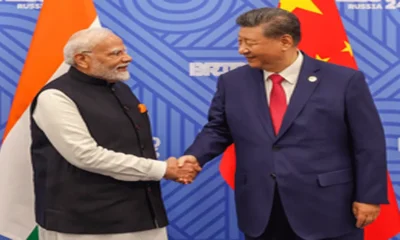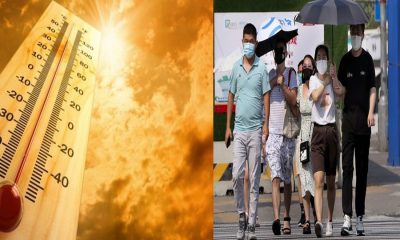Business
Alibaba best-paying tech company in China despite crackdown

Despite China aiming to rein in domestic Internet giants, Alibaba is still the best-paying tech company in the country at an average monthly salary of $5,000, followed by ByteDance and Tencent Holdings that offer average monthly wages of $4,900 and $4,600, respectively.
According to South China Morning Post, citing data from Chinese career and social-networking platform Maimai, the most generous tech companies in terms of annual bonuses last year were smartphone maker OPPO, Tencent Holdings, and Ant Group.
Huawei Technologies paid an average bonus of $25,000 last year, according to the data. Didi Chuxing was in the 10th spot with an annual bonus of $15,000.
According to China’s National Bureau of Statistics, the average nationwide annual per capita disposable income for 2021 was 35,128 yuan ($5,428), equivalent to about a month’s salary at one of the Big Tech companies, the report mentioned.
“The size of an annual bonus reflects a company’s financial performance, which is also an important symbol of an industry’s rise and fall, and can even act as a barometer of the economy,” Lin Fan, founder and Chief Executive of Maimai, was quoted as saying in the report.
Tech companies in China are paying hefty salaries and bonuses but this scenario might change with China planning to further shift its policies to control domestic tech giants like Alibaba and Tencent.
Chinese President Xi Jinping reportedly “intends to shift policies regarding its control over the country’s major tech companies such as Alibaba Group and Tencent Holdings”.
“The move is apparently aimed at revitalising the internet sector and propping up the Chinese economy, which is losing momentum amid the Russian invasion of Ukraine and the country’s zero-Covid policy”.
Since last year, Chinese regulatory authorities have been cracking down harder on domestic tech giants to end their dominance in the internet sector.
In March, Covid-19 lockdowns and China’s position on the Ukraine conflict led to tech shares rout, slashing billions of dollars from the likes of Alibaba Group Holding and Tencent Holdings in Hong Kong.
Chinese stocks in the US also suffered their biggest selloff since 2008 after US regulators identified five companies that could be subject to delisting for failing to comply with auditing requirements.
In December last year, Alibaba announced a major reshuffle at the top, as the country tightened its stand against domestic Big Tech companies over data and internet regulations.
Alibaba also unveiled major reorganisation plans to boost its strategy of domestic and international e-commerce.
Business
PM Modi meets Keir Starmer in Mumbai for strengthening India-UK ties

Mumbai, Oct 9: Prime Minister Narendra Modi welcomed UK Prime Minister Keri Starmer at Raj Bhavan and held a meeting as part of the process to strengthen the strategic partnership between the two countries.
The Ministry of External Affairs shared photos of Prime Minister Narendra Modi meeting UK Prime Minister Keir Starmer.
“Together for stronger India-UK ties…,” posted Randhir Jaiswal, the MEA spokesperson, on X.
Earlier, Commerce and Industry Minister Piyush Goyal said his meeting with UK Prime Minister Keir Starmer here further deepened trade and economic partnership for mutual prosperity between the two nations.
Starmer arrived in India for a two-day visit on Wednesday, accompanied by the biggest-ever trade delegation from the country to India.
“Delighted to call on UK Prime Minister Keir Starmer. Discussed avenues to further deepen India-UK trade and economic partnership for mutual prosperity,” Goyal posted on X social media platform.
Goyal earlier met Peter Kyle, the UK’s Secretary of State for Business and Trade, with a view to moving forward with the operationalisation of the India-UK Comprehensive Economic and Trade Agreement (CETA) and doubling the bilateral trade by 2030.
“The meeting marked a significant step towards operationalising the India-UK CETA, with both Ministers agreeing to reposition the Joint Economic and Trade Committee (JETCO) to oversee its implementation and delivery,” according to the Commerce Ministry statement.
Both sides underlined their commitment to ensuring swift, coordinated, and results-oriented implementation of the Agreement, aimed at realising its full potential for businesses and consumers in both countries. The ministers reaffirmed their shared ambition to double bilateral trade by 2030, leveraging the complementarities between the two economies in areas such as advanced manufacturing, digital trade, clean energy, and services.
Emphasising the transformative scope of CETA, they discussed ways to maximise its benefits through regulatory cooperation, addressing non-tariff barriers, and promoting supply chain integration. The highly productive Commerce Secretary and Director General-level meeting set the tone for the Ministerial meeting, which laid a strong foundation for a full day of engaging and forward-looking discussions.
Business
Sensex, Nifty open flat with positive bias amid global optimism

Mumbai, Oct 9: Indian stock markets opened flat but with a slight positive tone on Thursday, taking cues from upbeat global trends.
At the opening bell, the Sensex was up 17 points, or 0.02 per cent, at 81,791, while the Nifty gained 17 points, or 0.07 per cent, to trade at 25,063.
“From a technical standpoint for Nifty, a sustained move above 25,150 could open the door for an upside toward 25,200–25,250,” analysts said.
“On the downside, immediate support is placed around 24,950–24,900, which may serve as potential accumulation zones for long positions,” they added.
“Overall, the index is expected to remain range-bound between 24,900 and 25,200 in the near term,” experts mentioned.
Broader markets also saw some strength, with the Nifty MidCap index rising 0.3 per cent and the Nifty SmallCap index advancing 0.21 per cent.
On the institutional front, Foreign Institutional Investors (FIIs) extended their buying streak for the second consecutive session on October 8, purchasing equities worth Rs 81 crore, while Domestic Institutional Investors (DIIs) bought equities worth Rs 329 crore on the same day.
Asian markets traded higher after the S&P 500 and Nasdaq Composite hit record closing highs overnight on Wall Street.
Investor sentiment also improved after US President Donald Trump announced that Israel and Hamas had agreed to the first phase of a US-brokered peace plan to pause fighting in Gaza and allow the release of hostages and prisoners.
According to experts, traders remained cautiously optimistic, tracking global cues and geopolitical developments.
“The results season starting today will be keenly watched by the market. IT stocks have witnessed some recovery from the bottom, but the headwinds for the segment continue to be strong,” market experts said.
“Banking stocks have largely remained range bound on muted earnings expectations. The NIM pressure and rising delinquencies in the unsecured loan segments will weigh on banking results generally. So, watch out for the out-performers in the segment,” they added.
Business
World Bank flags rising poverty levels in Pakistan

New Delhi, Oct 8: The World Bank has expressed serious concern over Pakistan’s economy as the country has failed to reduce poverty despite massive loans injected by the IMF.
The current model of growth has failed to ameliorate the conditions of the poor, and the headcount ratio (HCR) has surged to its highest level of 25.3 per cent in the last eight years, which is a 7 per cent increase in HCR since 2023, the World Bank report states.
Instead of concentrating on rural development to reduce poverty, the Pakistan government has been focused more on increasing defence expenditure.
The World Bank report titled “Reclaiming Momentum Towards Prosperity: Pakistan’s Poverty, Equity and Resilience Assessment” released on September 23, mentions that even the country’s aspiring middle class (constituting 42.7 per cent of its population) is “struggling to achieve full economic security”.
Pakistan’s once-promising poverty reduction trajectory has come to a troubling halt, reversing years of hard-fought gains.
After dramatically reducing poverty from 64.3 per cent in 2001 to 21.9 per cent in 2018 — declining by 3 percentage points annually until 2015 before slowing to less than 1 percentage point per year — recent compounding shocks have pushed poverty rates back up to a projected 25.3 per cent by 2023-24, the report states.
The economic model that delivered early wins has reached its limits, with 14 per cent of the population in 2018 remaining vulnerable to falling back into poverty when faced with shocks.
Compounding crises — Covid-19, economic instability, devastating floods, and record-high inflation—have further exposed systemic weaknesses, leaving many in low-productivity activities and unable to cope with these challenges, the report points out.
Bold policy reforms are now essential to address structural imbalances, prevent sliding back into poverty during shocks, and tackle the persistent challenges in remote areas. In this context, this Poverty, Equity, and Resilience Assessment , the first since the early 2000s, looks at how poverty has evolved in Pakistan by combining traditional and non-traditional data, offering detailed analysis and strategic direction on the country’s efforts and challenges to reduce poverty and promote equity.
This comprehensive assessment aims to provide a roadmap for policymakers and stakeholders to address poverty and equity challenges in Pakistan effectively, the report added.
-

 Crime3 years ago
Crime3 years agoClass 10 student jumps to death in Jaipur
-

 Maharashtra1 year ago
Maharashtra1 year agoMumbai Local Train Update: Central Railway’s New Timetable Comes Into Effect; Check Full List Of Revised Timings & Stations
-

 Maharashtra12 months ago
Maharashtra12 months agoMumbai To Go Toll-Free Tonight! Maharashtra Govt Announces Complete Toll Waiver For Light Motor Vehicles At All 5 Entry Points Of City
-

 Maharashtra1 year ago
Maharashtra1 year agoFalse photo of Imtiaz Jaleel’s rally, exposing the fooling conspiracy
-

 National News12 months ago
National News12 months agoMinistry of Railways rolls out Special Drive 4.0 with focus on digitisation, cleanliness, inclusiveness and grievance redressal
-

 Maharashtra11 months ago
Maharashtra11 months agoMaharashtra Elections 2024: Mumbai Metro & BEST Services Extended Till Midnight On Voting Day
-

 National News1 year ago
National News1 year agoJ&K: 4 Jawans Killed, 28 Injured After Bus Carrying BSF Personnel For Poll Duty Falls Into Gorge In Budgam; Terrifying Visuals Surface
-

 Crime12 months ago
Crime12 months agoBaba Siddique Murder: Mumbai Police Unable To Get Lawrence Bishnoi Custody Due To Home Ministry Order, Says Report




















